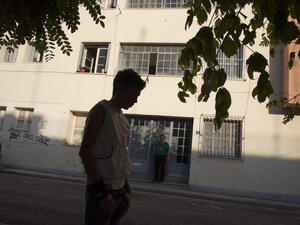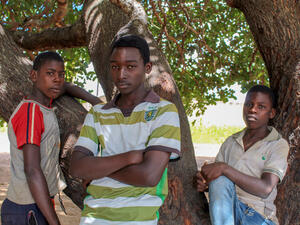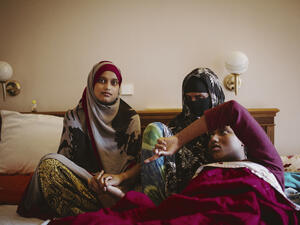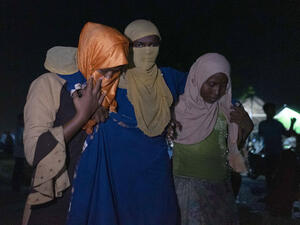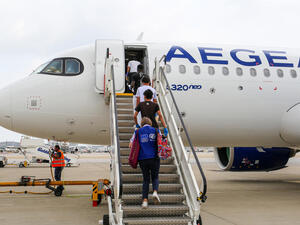Kosovo Crisis Update
Kosovo Crisis Update
Returns
More than 755,000 Kosovars have returned to Kosovo since the deployment of KFOR troops in the Serbian province in mid-June. Of this total, 714,000 returned from neighbouring countries and territories, while the rest came from third countries, mostly in Europe but also farther afield, including North America and Australia.
Over the past ten days, around 1,200 Kosovar refugees flew directly into the province's capital of Pristina, while another 3,000 flew into Skopje in the FYR of Macedonia, bringing the overall count of returns by air from 27 different countries to 36,400. Roughly half of this number came on flights organized by the International Organization for Migration. Another 5,000 Kosovars from Europe, mainly from Germany and Switzerland, have returned overland through Albania, according to UNHCR staff in that country.
Returns of Kosovars who had found safety in the FYR of Macedonia, Albania, Bosnia and Herzegovina and Montenegro totalled just 2,700 in the last five days.
It is estimated that only around 50,400 Kosovar refugees and displaced people remain in the neighbouring territories, including 11,000 in Albania, 8,000 in Montenegro, 20,000 in the FYR of Macedonia and 11,400 in Bosnia and Herzegovina.
Kosovo
UNHCR in Pristina on Wednesday said that the situation of the remaining Serbs in Pristina town - estimated at no more than 2,000 from a pre-war figure of more than 20,000 - has noticeably worsened over the last few weeks, with increasingly violent attacks on the rise.
There were at least nine murders and seven serious assaults in the city last week, KFOR said, and bomb and grenade attacks on Serb homes, churches and businesses are a regular occurrence. Even elderly women are not being spared. Two were shot through the doors of their apartments - a 79-year-old lady on Sunday and a 70-year-old on Monday night.
In general, a disturbing pattern has arisen in the method of intimidation used against Serbs still in the city. In many cases a warning letter is received ordering them to leave their homes, then the threat is delivered in person, followed a few days later by physical assault, in some cases even murder. In addition, in a method reminiscent of tactics used by Bosnian Serbs against Muslims during the war in Bosnia and Herzegovina, increasing numbers of Serbs are being forced to sign letters transferring rights over their property to Albanians before they flee. These practices are being applied in some cases to whole blocks of apartments, triggering the simultaneous departure of tens of families.
One woman living north of the Beogradska district of Pristina told UNHCR how a group of Albanians entered her house a few nights ago, murdered her elderly father and abducted her brother. She is now a virtual hostage in her own home with her 10-year-old daughter who is clearly scarred by the dreadful events she witnessed. In the Ulpjiana district, a 76-year-old infirm woman living alone has been reduced to a state of terror because of daily visits from Albanians ordering her to leave her home.
The freedom of movement of Serbs in the city is virtually non-existent. Not only are they afraid of making use of public facilities, such as hospitals, or visiting shops and markets, but they also cannot readily avail themselves of humanitarian assistance. As a result, UNHCR Pristina together with NGOs and KFOR has been engaged in the time-consuming and manpower intensive process of directly distributing assistance to Serbs in their homes. Several distribution points for the Serb population have been set up, often in the basement of Serb buildings. UNHCR Pristina has also provided fuel so that local health professionals can make home visits. Undoubtedly, however, there are still individuals who are in dire need of assistance but whose whereabouts are not known to aid agencies.
The situation of the remaining Serbs is particularly disturbing because they are mainly vulnerable persons, many of them being elderly, disabled or isolated without family support. As a result, they require a case-by-case approach involving visits to individual homes. UNHCR staff in Pristina say that the irony in the current situation is that the remaining Serbs are the least likely to have been involved in atrocities against Albanians, since most of the authors of such acts are believed to have fled the province.
Shelter in Kosovo
One of the biggest challenges for the international community is to ensure that everyone in Kosovo has shelter this winter. According to a variety of surveys, the needs remain enormous.
A "Rapid Village Assessment" coordinated by UNHCR looked into housing in more than 450 villages and found more than 50,000 homes destroyed or uninhabitable. The U.S. National Imagery and Mapping Agency did an aerial survey in May/June which covered the whole province and found 67,000 buildings seriously damaged or destroyed. And an assessment by the European Union/International Management Group of 1,383 villages concluded that 78,000 homes are seriously damaged or destroyed.
Major reconstruction is unlikely to be done before winter. Limited time, production and logistical constraints mean that only a relatively small number of houses will be reconstructed before the snow falls. UNHCR and its partners, especially those funded by ECHO and the OFDA, have adopted a practical appoach to try to assist those who have returned to a damaged house to construct one or two weatherproof rooms before winter. Components being provided include reinforced roofing plastic, wood strips, plywood, tools, nails, window plastic, light timber and other materials.
Between them, UNHCR and other agencies will deliver more than 78,000 shelter kits and 15,000 winterized tents with stoves. But this humanitarian assistance does not address the issue of the definitive rebuilding of the destroyed homes. Many returnees will have to stay with host families or in community shelters until longer term reconstruction gets underway.
Federal Republic of Yugoslavia
UNHCR's Special Envoy Dennis McNamara is travelling to Belgrade this week to look into the situation of displaced Serb and Roma people from Kosovo who have moved into Serbia and Montenegro. They are estimated to number 179,000 and are facing increasing difficulties. Among them are 3,000 Croatian and Bosnian Serb refugees from earlier conflicts in the region.
Around 130,000 of these displaced people are believed to have arrived in Serbia and Montenegro since the deployment of KFOR in Kosovo in June. Yugoslav authorities say more than 90,000 of them are in central and southern Serbia. Others are in Belgrade and in the northern Vojvodina province, as well as in Montenegro.
In addition, there are around half a million refugees from Croatia and Bosnia and Herzegovina still staying in Serbia and Montenegro.
Most of the newly displaced are staying with host families, but many are living in very difficult conditions in tents and collective centres.
For example, in Bujanovac municipality the Yugoslav Red Cross, has registered 3,179 IDPs from Kosovo: 1,300, including 300 Roma, are living in tents and collective centres, including a monastery, schools and motel sites, and the rest in private homes. They are assisted by the local Red Cross with supplies from UNHCR.
UNHCR's assistance programme in Serbia and Montenegro continues. UNHCR has delivered hygiene kits, blankets, mattresses, soap and sanitary napkins in the Belgrade, Kraljevo and Novi Sad areas as well as in Montenegro and has sent plastic sheeting for roof repair to the Roma camp on the outskirts of Podgorica.
Meanwhile in Montenegro, arrivals of Serb and Roma people from Kosovo have slowed. Some 170 arrivals were reported in the past week, bringing the overall total of arrivals there since the end of the airstrikes in Kosovo to 23,400.
The first tents for displaced Roma at a site being built at Konik will be ready for occupation this week. Water and sanitation facilities are also being installed. The Italian agencies Intersos and COOPI will run the camp.
At Niksic, the municipal government has allocated a site for 500 Roma scattered in the town.
Refugee minors in FYR of Macedonia
As agreed between UNHCR, ICRC and UNICEF, the International Committee of the Red Cross (ICRC) has investigated all reports of unaccompanied refugee minors (UAM) in the FYR of Macedonia and has compiled reports on these cases. ICRC is responsible for tracing of relatives. UNICEF provides psychosocial counselling for these children prior to reunification and departure from the FYR of Macedonia. UNHCR, UNICEF and ICRC work with embassies regarding family reunification of unaccompanied minors, including those whose families live abroad.
ICRC has looked into 62 reported cases of unaccompanied minors living either in camps or in host families in the FYR of Macedonia. Most of these cases are children who are in fact not unaccompanied, but they are staying with non-parent relatives, friends or former neighbours, rather than with their own parents. In many cases the location of the parents is in fact known, and they return to pick up their children or the children return to Kosovo in extended family groups to be reunited with their parents there.
Of the 18 children living in camps without one or both of their parents, the majority are males between the age of 11-18 and are living with non-parent relatives. In nearly all cases the location of the parents is known. In two cases, the minors (ages 16 and 17) have refused to reunite with their parents, with whom ICRC is in contact. In one case, a child was abandoned in a camp and is currently with a host family, but it is uncertain whether the child is Macedonian or Kosovar. Tracing efforts continue.




